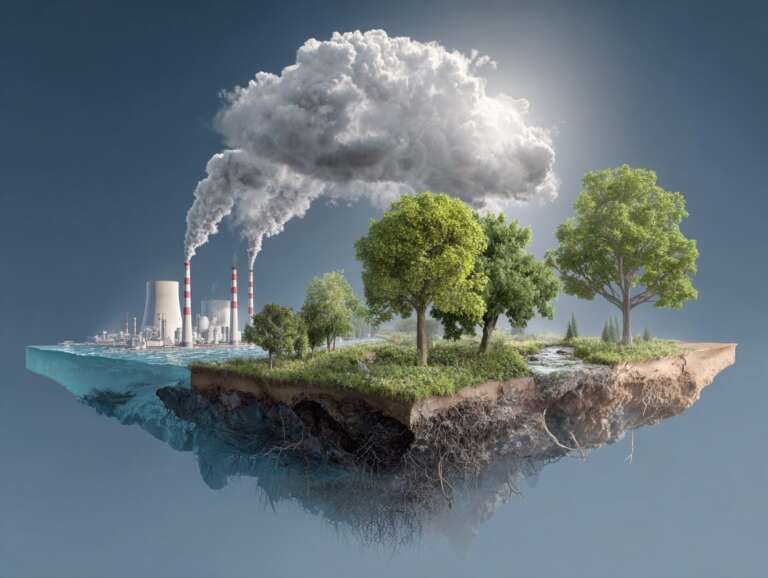Have you ever wondered why CO2 is so frequently blamed for climate change? It’s not just a buzzword thrown around in environmental discussions; it’s the heavyweight champion of greenhouse gases. Carbon dioxide (CO2) plays a pivotal role in the greenhouse effect, trapping heat in our atmosphere and driving global warming. But here’s the kicker: understanding CO2’s role is not just for scientists and policymakers. It’s crucial for you, too. By grasping how CO2 impacts our planet, you can make informed decisions about climate action and sustainability practices that matter.
TL;DR: CO2 is a major greenhouse gas contributing to global warming. Understanding the greenhouse effect is crucial for addressing climate change. Practical actions can be taken to reduce CO2 emissions and mitigate climate impacts.
What is CO2 and Why is it Important?
Let’s break it down. Carbon dioxide (CO2) is a colorless gas that’s a natural part of our atmosphere. It’s produced by both natural processes, like respiration and volcanic eruptions, and human activities, primarily through burning fossil fuels such as coal, oil, and natural gas. In fact, since the Industrial Revolution, human activities have increased atmospheric CO2 levels by over 40%. That’s staggering!
But why should you care? CO2 is a key player in the carbon cycle, a natural process that regulates the Earth’s temperature. Plants absorb CO2 during photosynthesis, and when they die, they release it back into the atmosphere. This cycle is vital for maintaining the balance of greenhouse gases. However, human activities have disrupted this balance, leading to an alarming rise in CO2 levels compared to other greenhouse gases like methane and nitrous oxide. While methane is more potent in the short term, CO2 lingers in the atmosphere for centuries, making it a long-term threat to our climate.
The Greenhouse Effect: How CO2 Traps Heat
Here’s the brutal truth: the greenhouse effect is not just a theory; it’s a reality that’s heating our planet. Imagine wrapping the Earth in a thick, cozy blanket. That’s what greenhouse gases do—they trap heat from the sun. When sunlight reaches the Earth, some of it is reflected back into space, but greenhouse gases like CO2 absorb and re-radiate some of that heat, warming our atmosphere.
This process is essential for life as we know it, but here’s the catch: increased CO2 levels amplify this effect, leading to higher global temperatures. In fact, the average global temperature has risen by about 1.2 degrees Celsius since the late 19th century, closely correlating with the rise in CO2 levels. Graphs depicting this relationship are eye-opening—showing a steep incline in temperature alongside CO2 concentrations. If that doesn’t make you sit up and take notice, what will?
Consequences of Elevated CO2 Levels on Climate
Now, let’s talk consequences. Elevated CO2 levels are not just a statistic; they have real-world implications that affect everyone. Increased temperatures lead to more extreme weather patterns—think hurricanes, droughts, and heatwaves. In 2020 alone, the world witnessed a record number of natural disasters linked to climate change, with damages running into billions of dollars.
Sea level rise is another alarming consequence. As glaciers and ice sheets melt, coastal cities face the threat of flooding. Places like Miami and New Orleans are already experiencing the effects, with streets becoming waterways during high tides. And let’s not forget about ecosystems. Coral reefs are dying off at an unprecedented rate due to warming oceans and acidification caused by CO2 absorption. The loss of biodiversity is not just an environmental issue; it’s a threat to food security and human health.
Mitigating CO2 Emissions: Practical Steps
So, what can you do about it? The first step is recognizing the importance of reducing fossil fuel use. Transitioning to renewable energy sources like wind, solar, and hydroelectric power is crucial. Not only do these alternatives produce little to no emissions, but they also create jobs and stimulate economic growth.
But it doesn’t stop there. You can take practical actions in your daily life to lower your carbon footprint. Consider using public transportation, biking, or walking instead of driving. Reduce energy consumption at home by using energy-efficient appliances and switching to LED lighting. Even small changes, like reducing meat consumption or supporting local farmers, can add up to significant reductions in CO2 emissions.
Success stories abound. Countries like Denmark have made remarkable strides in reducing CO2 emissions through aggressive renewable energy policies. Communities are coming together to implement local sustainability initiatives that inspire others to follow suit. The reality is, every action counts.
Future Outlook: Innovations to Combat CO2 Emissions
What does the future hold? The good news is that innovation is on our side. Emerging technologies in carbon capture and storage (CCS) are gaining traction, allowing us to capture CO2 emissions from industrial processes and store them underground. This could be a game-changer in our fight against climate change.
Policy plays a critical role, too. International agreements like the Paris Accord aim to limit global warming to well below 2 degrees Celsius. Public awareness and education are essential for driving change. The more people understand the impact of CO2 and climate change, the more pressure there will be on governments and corporations to act.
Recent research shows promising advancements in carbon-neutral technologies and sustainable practices. Initiatives like reforestation and soil carbon sequestration are gaining momentum, proving that we can combat CO2 emissions while restoring our planet.
Conclusion
In summary, CO2 is not just a gas; it’s a significant contributor to climate change that demands our attention. Understanding its role in the greenhouse effect and the consequences of elevated levels is crucial for everyone. The time to act is now. By adopting sustainable practices and advocating for policies that reduce CO2 emissions, you can be part of the solution.
What are your thoughts on CO2 and climate change? How do you plan to contribute to mitigating its effects? Share your ideas and let’s work together to create a sustainable future!

